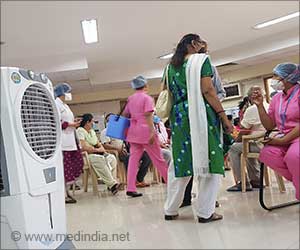Year 2007 will go down in the medical history of India as a period in which doctors made significant strides in stem cell therapy and broke new ground in medical innovation, while there was equally no dearth of controversies involving medical practitioners, politicians, legal and health administrators.
The achievements in the health sector, more so the success in treating rare deformities, has certainly created a strong platform for well deserved breakthroughs in the future as well.The crowing glory of the medical advances made by Indian doctors came towards the end of the year when surgeons in the southern city of Bangalore succeeded in giving a fresh lease of life to a two year old girl Lakshmi, who was born with an unusual deformity of four arms and legs. The condition occurred as her body remained fused to the pelvis of a twin that had stopped developing in her mother’s womb.
Dr Sharan Patil led a team of surgeons to separate the child from her headless conjoined twin after a marathon 27-hour operation at a private hospital in mid-December, an event celebrated by the international media itself.
This was the first time that such a rare and risky surgical procedure was performed successfully in India. Doctors said that Lakshmi’s condition occurred in only one in 50,000 conjoined twin births worldwide.
As the little Lakshmi became the cynosure of all eyes, the achievement of the doctors won international acclaim with the media constantly remaining focused on the event for nearly a week.
Several private hospitals, particularly those in the southern cities of Chennai and Bangalore, established exclusive research labs to pursue stem cell technology as a sure shot remedy for key surgeries.
Acknowledging the reforms in health insurance, Dr K J Mathiazhagan, former professor of Orthopedics at the Government Kilpauk Medical College Hospital in Chennai, says that healthcare had improved to a great extent this year along with awareness among the public.
“Several insurance companies and banks have come forward to provide mediclaims. People must grab this opportunity and start investing for their health as it would cover their entire family,” he advises.
Predictably the court ruling was hailed internationally, especially by those who were agitated by the inequities of the patent system that left millions of poor high and dry.
The company, though, is unrelenting in its legal battle, and is now fighting it in a different forum – the Intellectual Property Appellate Board.
On the other hand in the last 12 months, quite a few Indian doctors did have their run-ins with the law.
At least two cases need mention in this round up of the health scenario. One, the shocking case of a doctor couple in central Tamil Nadu supervising their 15-year old son perform caesarean on a woman. Two, a well-known nephrologist from Chennai being charged with operating an international kidney racket.
In the first instance, a surgeon Dr Murugesan, hailing from small town Manapparai proudly played a Video Compact Disc to an audience from the local unit of the Indian Medical Association in which his school-going son was shown performing caesarean section. A shocked medical fraternity immediately called for action against the doctor, while the police hunted for his son. Caught in a tight spot, the doctor later claimed that he had performed the surgery and not his son, but that did not hold water. Ultimately the doctor couple were barred from practising by the state medical council.
The second case involved Dr P Ravichandran who was arrested by the police in Mumbai, India’s commercial capital, for operating a kidney racket, violating the Human Organ Transplantation Act. The doctor is now in jail and has been accused of trade in human organs to help patients from as far as Bangladesh, India’s neighbour in the east.
“Both these incidents are a blot on the medical profession. They should certainly serve as an eye-opener for doctors and make the government strengthen vigilance of this sector,” says Dr N Mohandas, president of the Tamil Nadu unit of the Indian Medical Association.
And for the first time in the country, its federal Health Minister Anbumani Ramadoss fought, what seemed almost like a pitched street battle, though sans violence, with Dr P Venugopal, the administrative head of the All India Institute for Medical Sciences (AIIMS). It is a prestigious government teaching hospital situated in the national capital of New Delhi.
In an interim victory, the Health Minister sacked Dr Venugopal from the post, but the war has hardly been won, what with the matter now being in the domain of the Supreme Court.
Minister Ramadoss was also the target of attack by undergraduate medical students in the country, particularly in his home state of Tamil Nadu, for seeking to introduce a year’s rural practice as a prerequisite for completing the medical degree course. Strikes and agitations forced the Minister to rethink his plan.
Such blemishes apart, the future does hold some good news for Indians with doctors set to capitalise on the rapid advancements in the field of surgery that has brought in a reverse flow of patients from abroad. Innovation and success could well be the watchwords for 2008 in the Indian medical arena, experts say.
But not to be forgotten, Dr Mohandas, enters the caveat - “The year surely witnessed several scientific advances in the medical field like that of stem cells, no doubt. At the same time, there have been several cases of diarrhea and viral infections.”
Nowadays everyone seems to be pitching for the privatization of healthcare, at least for public-private partnership, for starters. What it will all mean for the vast masses remains to be seen.
Source-Medindia
SK/M








